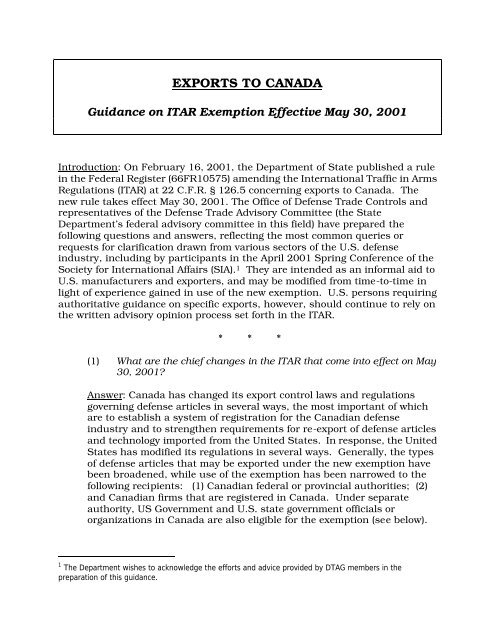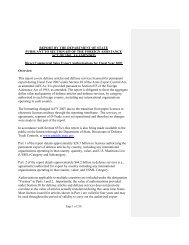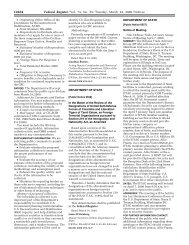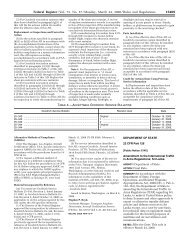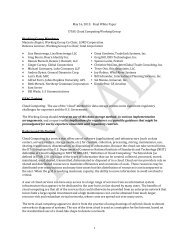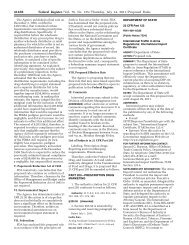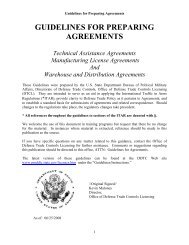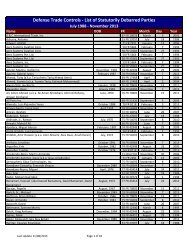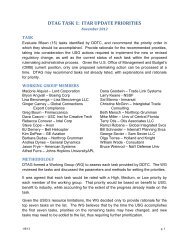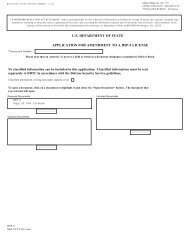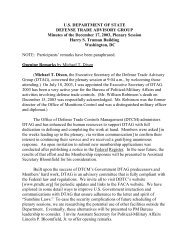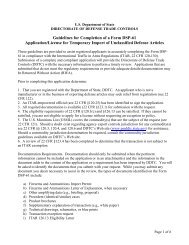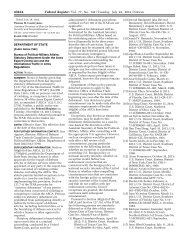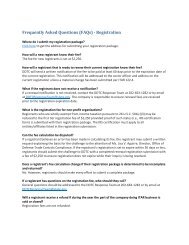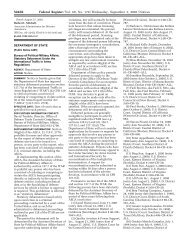EXPORTS TO CANADA - Directorate of Defense Trade Controls
EXPORTS TO CANADA - Directorate of Defense Trade Controls
EXPORTS TO CANADA - Directorate of Defense Trade Controls
Create successful ePaper yourself
Turn your PDF publications into a flip-book with our unique Google optimized e-Paper software.
<strong>EXPORTS</strong> <strong>TO</strong> <strong>CANADA</strong><br />
Guidance on ITAR Exemption Effective May 30, 2001<br />
Introduction: On February 16, 2001, the Department <strong>of</strong> State published a rule<br />
in the Federal Register (66FR10575) amending the International Traffic in Arms<br />
Regulations (ITAR) at 22 C.F.R. § 126.5 concerning exports to Canada. The<br />
new rule takes effect May 30, 2001. The Office <strong>of</strong> <strong>Defense</strong> <strong>Trade</strong> <strong>Controls</strong> and<br />
representatives <strong>of</strong> the <strong>Defense</strong> <strong>Trade</strong> Advisory Committee (the State<br />
Department’s federal advisory committee in this field) have prepared the<br />
following questions and answers, reflecting the most common queries or<br />
requests for clarification drawn from various sectors <strong>of</strong> the U.S. defense<br />
industry, including by participants in the April 2001 Spring Conference <strong>of</strong> the<br />
Society for International Affairs (SIA). 1 They are intended as an informal aid to<br />
U.S. manufacturers and exporters, and may be modified from time-to-time in<br />
light <strong>of</strong> experience gained in use <strong>of</strong> the new exemption. U.S. persons requiring<br />
authoritative guidance on specific exports, however, should continue to rely on<br />
the written advisory opinion process set forth in the ITAR.<br />
* * *<br />
(1) What are the chief changes in the ITAR that come into effect on May<br />
30, 2001?<br />
Answer: Canada has changed its export control laws and regulations<br />
governing defense articles in several ways, the most important <strong>of</strong> which<br />
are to establish a system <strong>of</strong> registration for the Canadian defense<br />
industry and to strengthen requirements for re-export <strong>of</strong> defense articles<br />
and technology imported from the United States. In response, the United<br />
States has modified its regulations in several ways. Generally, the types<br />
<strong>of</strong> defense articles that may be exported under the new exemption have<br />
been broadened, while use <strong>of</strong> the exemption has been narrowed to the<br />
following recipients: (1) Canadian federal or provincial authorities; (2)<br />
and Canadian firms that are registered in Canada. Under separate<br />
authority, US Government and U.S. state government <strong>of</strong>ficials or<br />
organizations in Canada are also eligible for the exemption (see below).<br />
1 The Department wishes to acknowledge the efforts and advice provided by DTAG members in the<br />
preparation <strong>of</strong> this guidance.
2<br />
* * *<br />
(2) When the new Canadian Exemption becomes effective on May 30,<br />
2001, may U.S. companies continue to use the pre-May 30 th<br />
Canadian exemption to cover activities with Canadian companies<br />
that have not yet registered under Canadian law?<br />
Answer: No. On May 30, 2001, the previous Canadian exemption is no<br />
longer valid; it has been revoked and replaced with the new provisions<br />
incorporated in § 126.5 <strong>of</strong> the ITAR effective on that date. Export<br />
activities with Canadian companies not registered in Canada require a<br />
State Department license from May 30 th onward unless another<br />
exemption in the ITAR is available (see below).<br />
* * *<br />
(3) What about Canadian crown corporations and other individuals and<br />
entities exempt under Canada’s laws and regulations from their<br />
new registration requirement? How should U.S. companies deal<br />
with exports to such exempt persons?<br />
Answer: The U.S. Government will generally require a State Department<br />
license effective May 30, 2001, for exports to all Canadian persons not<br />
registered with the Canadian Government. Under the new regulation,<br />
there are only two categories <strong>of</strong> recipients in Canada currently eligible for<br />
license-free exports under the new ITAR exemption: (1) federal and<br />
provincial authorities <strong>of</strong> Canada acting in an <strong>of</strong>ficial capacity and (2)<br />
Canadian firms registered in accordance with Canada’s new regulation. 2<br />
Under separate authority another category <strong>of</strong> eligible recipients are U.S.<br />
Government facilities, organizations and employees (e.g., a U.S.<br />
Department <strong>of</strong> <strong>Defense</strong> component) acting in an <strong>of</strong>ficial capacity or U.S.<br />
state government employees (e.g., law enforcement <strong>of</strong>ficers) acting in an<br />
<strong>of</strong>ficial capacity. 3 Importantly, even where a Canadian business entity is<br />
registered in Canada, this does not qualify all <strong>of</strong> its employees to receive<br />
U.S.-origin defense articles pursuant to this exemption, but only<br />
employees who are nationals, dual nationals or permanent residents <strong>of</strong><br />
Canada.<br />
2 As provided in the February 16, 2001 Federal Register notice, certain specified crown corporations may<br />
also be identified in the future by the Department <strong>of</strong> State as eligible for the exemption.<br />
3 The Director, Office <strong>of</strong> <strong>Defense</strong> <strong>Trade</strong> <strong>Controls</strong> has determined in accordance with 22 C.F.R. § 126.3<br />
that it is in the best interests <strong>of</strong> the United States to suspend the licensing provisions <strong>of</strong> § 123 when the<br />
articles to be exported license-free are permissible under § 126.5 (i.e., do not always require a license<br />
pursuant to § 126.5(b)) and the recipient is a U.S. Government facility, organization or employee acting<br />
in an <strong>of</strong>ficial capacity, such as a DoD component, or a U.S. state government employee acting in an<br />
<strong>of</strong>ficial capacity, such as a law enforcement <strong>of</strong>ficer. The U.S. exporter in this instance should cite §<br />
126.5 on the SED.
3<br />
* * *<br />
(4) The Federal Register notice <strong>of</strong> February 16, 2001, notes that it<br />
remains the responsibility <strong>of</strong> U.S. exporters “to determine, in writing,<br />
the Canadian end user, end-use, and that the Canadian recipient is<br />
registered with the Canadian Government….” What written<br />
information should be obtained, whether from the Canadian<br />
company or other sources, to satisfy this responsibility?<br />
Answer: Determinations <strong>of</strong> end-use and end user should follow<br />
established practices and corporate procedures (e.g., contracts, purchase<br />
orders, shipping records. etc.) arising from the record keeping<br />
requirements <strong>of</strong> the ITAR. Concerning registration <strong>of</strong> Canadian<br />
companies, the Canadian Government has agreed to post a list <strong>of</strong><br />
registered Canadian business entities (including individuals registered as<br />
doing business but not employees <strong>of</strong> registered companies) on a web site<br />
developed for that purpose (www.pwgsc.gc.ca/ciisd). U.S. exporters<br />
should download a copy <strong>of</strong> the relevant web site page that lists the<br />
Canadian registered business entities and maintain it with their shipping<br />
records or other export documentation as part <strong>of</strong> their record keeping<br />
requirements.<br />
* * *<br />
(5) May the Canadian exemption be used for access to controlled U.S.<br />
defense technology arising from employment <strong>of</strong> Canadians in the<br />
U.S. defense industry?<br />
Answer: This exemption only applies to Canadian registered business<br />
entities, with respect to specified items exempted fro9m licensing<br />
requirements, for end use in Canada. Thus, employment <strong>of</strong> foreign<br />
nationals (including Canadian nationals) in a U.S. defense company<br />
typically involves access to a variety <strong>of</strong> controlled technical data and<br />
other covered defense services. Even if the other criteria just mentioned<br />
to qualify for the exemption were met, defense services (except to the<br />
limited extent specified in § 126.5(c)) are generally not included within<br />
the exemption for Canada. Therefore, a technical assistance agreement<br />
or other written authorization will be required.<br />
* * *<br />
(6) May the Canadian exemption be used for discussions with a<br />
Canadian employee <strong>of</strong> a Canadian-registered company?
4<br />
Answer: Yes, the exemption may be used for discussions as long as the<br />
requirements <strong>of</strong> the exemption are met (e.g., the employee is a national,<br />
dual national or permanent resident <strong>of</strong> Canada and the discussions do<br />
not rise to the level <strong>of</strong> a defense service that is not eligible for the<br />
exemption). Other exemptions in the ITAR may also be available to cover<br />
such discussions when the requirements <strong>of</strong> those exemptions are met.<br />
* * *<br />
(7) Does § 126.5 describe the universe <strong>of</strong> exemptions that may be used<br />
for defense trade with Canada?<br />
Answer: No. Eligible U.S. exporters may use any other exemption in the<br />
ITAR available for export <strong>of</strong> defense articles, including technical data,<br />
and defense services to Canada (e.g., §§ 123.4, 123.16, 124.2, 125.4,<br />
126.6, and 126.14.) as long as the requirements <strong>of</strong> the exemptions relied<br />
upon can be met. If no exemption is available, then a license or other<br />
written authorization will be required.<br />
* * *<br />
(8) Are DSP-83s (Non-Transfer and Use Certificate) Still Required for<br />
Exports to Canada?<br />
Answer: Yes, with one new exception. Whether in a licensed export or<br />
pursuant to use <strong>of</strong> the exemption in § 126.5 a DSP-83 is always required<br />
for exports involving significant military equipment (SME), except that it<br />
is no longer necessary, due to an exchange <strong>of</strong> diplomatic notes between<br />
the United States and Canada, to obtain the signature <strong>of</strong> the Canadian<br />
Government when it is the recipient and end user. For example, when<br />
there is a direct shipment <strong>of</strong> SME to a Canadian Government<br />
department, no DSP-83 is needed. Where the shipment involves private<br />
intermediate consignees, the consignees are still required to execute the<br />
DSP-83, but the Canadian Government is not.<br />
* * *<br />
(9) How will notifications to the U.S. Congress pursuant to the Arms<br />
Export Control Act be handled?<br />
Answer: Any transaction involving the export <strong>of</strong> defense articles or<br />
defense services for which Congressional notification is required is not<br />
eligible for the Canadian exemption (See § 126.5(b)(4)) and requires a<br />
license or other written authorization.<br />
* * *
5<br />
(10) What obligations does a U.S. exporter have to inquire into the<br />
Canadian or dual nationality <strong>of</strong>: (a) employees <strong>of</strong> Canadian<br />
registered companies; (b) employees <strong>of</strong> Canadian companies that<br />
have not registered in Canada; or (c) unregistered individuals (e.g.,<br />
sole proprietors)?<br />
Answer: The basic premises <strong>of</strong> U.S. law and regulation governing the<br />
export <strong>of</strong> defense articles and defense services require that such items be<br />
used abroad for the purposes intended and by the foreign persons<br />
authorized, whether licensed or authorized pursuant to an exemption.<br />
Therefore, with respect to exports <strong>of</strong> defense articles and defense services<br />
to Canada -- whether or not licensed -- U.S. persons need to take<br />
responsible steps to ascertain and ensure the eligibility <strong>of</strong> both the items<br />
and recipients.<br />
• With respect to the eligibility <strong>of</strong> Canadian recipients for items exempt<br />
under § 126.5, U.S. exporters will need to establish in most cases<br />
(e.g., except for Canadian federal authorities): (1) that their Canadian<br />
business partner is registered in Canada if the transaction<br />
contemplated will rely on a license exemption; and (2) that access is<br />
limited to eligible employees, meaning nationals, dual nationals and<br />
permanent residents <strong>of</strong> Canada.<br />
• Notably, Canada has exempted from its registration requirements<br />
Canadian crown corporations and temporary employees and visitors.<br />
This exemption from Canadian registration requirements by Canada,<br />
however, may not be construed by U.S. exporters as establishing<br />
eligibility for license free receipt <strong>of</strong> U.S. defense articles under the<br />
ITAR. 4<br />
• Similarly, the basic responsibility for U.S. exporters regarding the<br />
foreign nationality <strong>of</strong> employees <strong>of</strong> registered Canadian companies<br />
with respect to items exempt under § 126.5 is to establish that only<br />
Canadian nationals, Canadian dual nationals and Canadian<br />
permanent residents (i.e., landed immigrants) will have access to U.S.<br />
defense articles. Access by other foreign nationals in Canada must<br />
be approved in writing through a State Department license.<br />
• With respect to licensed transactions (including technical assistance<br />
agreements), access by all foreign nationals (including Canadian<br />
nationals and permanent residents holding foreign nationalities) will<br />
be approved in writing in the normal way.<br />
4 As noted previously, certain Canadian crown corporations may be identified by the Department <strong>of</strong> State<br />
in the future as eligible for the exemption under § 126.5.
6<br />
* * *<br />
(11) What is the responsibility <strong>of</strong> U.S. exporters in the case <strong>of</strong> a Canadian<br />
dual national or permanent resident who also holds nationality from<br />
a country proscribed by § 126.1 <strong>of</strong> the ITAR?<br />
Answer: As noted in the Department’s February 16 th Federal Register<br />
notice, it remains the responsibility <strong>of</strong> the U.S. exporter <strong>of</strong> record to<br />
determine, in writing, the Canadian end-user, end use, that the<br />
Canadian recipient is registered with the Canadian Government, and<br />
that the defense articles are for end use in Canada and not for reexport<br />
or retransfer to another foreign destination. Should this information not<br />
be available or the exporter has knowledge or reason to know that the<br />
export would result in a transfer or sale to a proscribed destination (see §<br />
126.1), this exemption is not available. Thus, the rule change does not<br />
affect the continuing application <strong>of</strong> other requirements <strong>of</strong> the ITAR, in<br />
particular § 126.1(e), which requires any person who knows or has<br />
reason to know <strong>of</strong> a prohibited activity involving a proscribed country to<br />
immediately inform the Office <strong>of</strong> <strong>Defense</strong> <strong>Trade</strong> <strong>Controls</strong>. Further (also<br />
noted in the February 16 th notice), Canadian registered persons are<br />
eligible recipients <strong>of</strong> ITAR-controlled items under the new exemption,<br />
except where application <strong>of</strong> U.S. law may require prohibiting (e.g., by<br />
treating a transaction as non-exempt or a Canadian registered person as<br />
ineligible on a case-by-case basis, or more broadly) an export, re-export<br />
or transfer <strong>of</strong> such an item to a person with citizenship or nationality <strong>of</strong> a<br />
country to which U.S. defense exports are prohibited by law.<br />
• For example, in the case <strong>of</strong> a Canadian dual national/permanent<br />
resident employee <strong>of</strong> a Canadian registered firm who will have access<br />
to U.S. defense articles under the exemption and who holds<br />
citizenship <strong>of</strong> a country whose government has been designated by<br />
the Secretary <strong>of</strong> State pursuant to section 40 <strong>of</strong> the Arms Export<br />
Control Act as a sponsor <strong>of</strong> terrorism, should the U.S. exporter know<br />
or have reason to know that the export would result in a transfer or<br />
sale to the proscribed destination, then the U.S. exporter should not<br />
allow the export to proceed under the exemption and should consult<br />
the Office <strong>of</strong> <strong>Defense</strong> <strong>Trade</strong> <strong>Controls</strong>.


